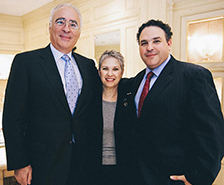Matthew Rosenheim ’92
 Q: Tell us about your career path and where you are today.
Q: Tell us about your career path and where you are today.
A: After graduating from SU, I went on to study for my Gemological degree at the Gemological Institute of America. My plan was to work in the diamond industry in New York prior to returning to work. That plan changed when my family decided to acquire a building and do a major expansion. I moved back to Washington, DC, to work in the family business. I played many roles in the business over the years, and now I own the business and run the day-to-day activities of the business. We have just recently gone through another significant expansion adding over 8,000 square feet to our existing footprint, which puts the size of our operation over 20,000 square feet. Expansion has occurred across all areas of our business from product categories to our own in-house manufacturing and watch making facilities.
Q: How did your SU experience prepare you for your career?
A: When I went to Syracuse, I knew that I both cared about and enjoyed my family business. However, I wasn’t fully committed and really wanted the opportunity to explore other areas of interest and career paths through my studies. While I chose to study political science (a natural area of interest for a kid who grew up in DC where national politics are our local politics), it didn’t turn out to be my career path. What I loved about my SU education was the flexibility it provided. I was allowed to take classes in art and art history, business and management, as well as an amazing array of classes in my major. While my major didn’t end up relating directly to my career path, being able to understand and converse intelligently with major political players (who made up an important part of our client base) over a broad array of topics was a huge advantage in relationship building, and it continues to be very valuable today.
Q: Looking back, what SU experiences have been the most meaningful to you?
A: I studied abroad at SU in Florence. The program was amazing and completely opened my eyes to the world, and it made things seem possible that previously seemed unattainable or at least very far-fetched. The program inspired me and built resilience in learning how to live and navigate in a foreign country where my language skills were very limited. Additionally, my involvement in my fraternity continues to resonate in terms of the contacts and relationships I made and still maintain. A case in point occurred just recently. Unfortunately, a close fraternity brother is currently very sick with cancer. We had a large gathering outside of New York where people flew in from all over the country to show support, something that was amazing in and of itself. As I looked around the room, I realized that I had leaned on those people over the years in many different ways. Many I had conducted business with; one had worked for me as an attorney in another state. One referred me to resources to help care for an ailing family member. The tentacles of my SU network were and continue to be far-reaching and meaningful.
Q: Why do you feel that it is important to remain connected to the alumni network and the University?
A: The alumni network here in Washington is very strong, as is the case in many other cities. When you have a group of people with shared experiences and a common passion, it’s just natural to want to engage and help those people. The walls are broken down so much more easily than other circumstances. We all want to help open the door for one another and to see the University and its alumni do well and succeed in life. Helping just perpetuates the success of a place we all hold dear.
Q: What advice would you give students?
A: Put yourself in situations outside your comfort zone because this is where lots of growth occurs. Take advantage of the great opportunities Syracuse provides to engage with SU students and alumni, and don’t be shy to ask them to share experiences, knowledge, and connections. Create unique experiences for yourself that will help guide your future development.
Q: How did being an Orange legacy impact your Syracuse experience, and how have you continued to stay involved as an alum?
A: Being a legacy helped created a strong initial emotional connection to Syracuse and also created a common bond with my father and eventual business partner. I think I used my dad’s college experiences he shared with me to help guide my own path. When my Dad, who hadn’t studied abroad but really thought it would be a great experience for me, discussed the option with me, I was initially reluctant to leave campus. He reached out to a former classmate of his from Syracuse he knew and was still in touch with who had studied in Florence. This person took the time to speak with me about the amazing experience she had, and it really helped convince me to take the leap and go to Florence. She also wrote me a great letter of recommendation that I’m sure helped as well! There’s that great alumni network at work again!
